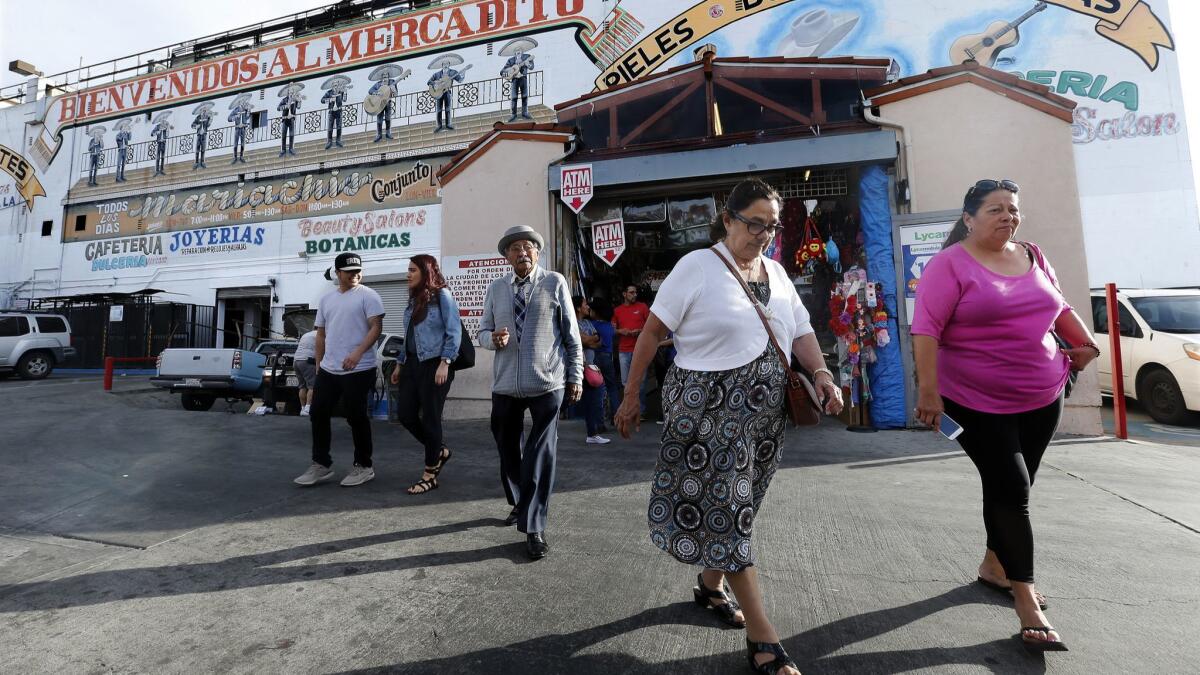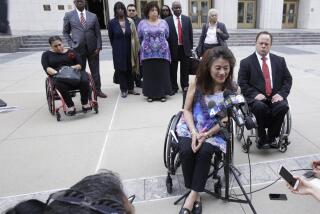El Mercado files suit to rescind approval of a Boyle Heights homeless housing project

The owners of the El Mercado shopping center have filed a lawsuit seeking to block a 49-unit project of affordable and homeless housing, opening a new chapter in a five-year battle that has pitted homeless advocates against a popular Boyle Heights institution.
The lawsuit, filed by El Mercado de Los Angeles and its owner Tony Rosado, asks for a writ ordering the City Council to vacate its approval of the project and demand a full environmental impact report.
The City Council approved the development by the nonprofit A Community of Friends March 6 when Councilman Jose Huizar, who represents Boyle Heights, changed course after passionately opposing the project for years.
In a dramatic council hearing, Huizar, who had criticized the project as inappropriate for the location, said he had changed his mind after the developer accepted conditions that reduced the number of units reserved for mentally ill homeless people and increased the environmental scrutiny.
Rosado, however, continued to oppose the project, which would erect a four- and five-story apartment building on a vacant lot between the three-story shopping center on 1st Street and the historic Evergreen Cemetery to its west.
The lawsuit, filed Thursday in Los Angeles Superior Court, alleges that city officials allowed the project to go forward without adequate environmental study and that the City Council then inappropriately approved it based on the developer’s promise to do additional environmental work.
A spokesman for Los Angeles City Atty. Mike Feuer said Friday that the city, named as the defendant in the lawsuit, had not been served and would reserve comment. Dora Leong Gallo, executive director of A Community of Friends, also declined to comment until she could review the lawsuit.
The project became a cause for influential civic and nonprofit leaders who feared that its rejection could set a precedent for local opposition across the city to homeless housing projects funded by the Proposition HHH bond measure approved by voters in 2016.
United Way of Greater Los Angeles, the Los Angeles Area Chamber of Commerce and the California Community Foundation, all major backers of HHH, lobbied for the project.
Huizar first spoke out against it in 2013 as a dissenting member of the Metropolitan Transportation Authority board, when it approved A Community of Friends’ plan to use surplus Metro land at 1st and Lorena streets.
He said his stance was not based on NIMBYism but rather changes in the plan that had reduced the retail space on the ground floor.
Los Angeles planning officials approved the project with a determination that any environmental problems at the site could be mitigated. The Rosado family appealed the environmental approval, forcing the proposal to go before the City Council.
As chairman of the city’s Planning and Land Use Management Committee, Huizar opposed the plan again last August, leading to a recommendation that the council accept Rosado’s appeal.
By then Rosado had retained the law firm of Robert Silverstein, which prepared a lengthy rebuttal. It cited environmental issues, including an abandoned oil well, and presented a log of crimes reported at another nearby building owned by A Community of Friends.
The developer then submitted a more detailed mitigation plan, saying it would resolve any environmental issues under the oversight of the appropriate state agencies.
The lawsuit contends that a full environmental report should have been completed before the project was approved.
Twitter: @LATDoug
More to Read
Sign up for Essential California
The most important California stories and recommendations in your inbox every morning.
You may occasionally receive promotional content from the Los Angeles Times.











